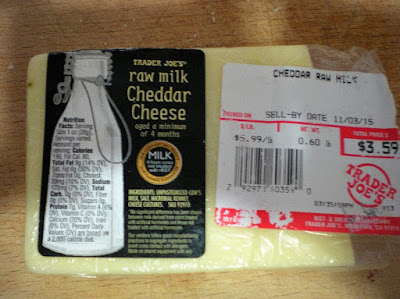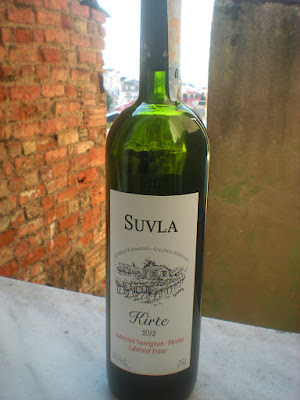My little brother visited me in October which was super exciting. I've been trying to get him to come for ages and finally did. Of course we did all the touristy things in Istanbul:
The Archaeology Museum (the sarcophagi are my favorite part):
The Aya Sofya:
The Topkapi Palace:
And the Kariye Museum (my personal favorite):
Since we were in the neighborhood, and especially since I'd never been, we decided to track down the Pammakaristos Church (Fethiye Museum) after leaving the Kariye. I had the address, Googled walking directions, printed them out, and even asked someone at the Kariye where the street was. It seemed relatively straight forward. But then we started walking and I remembered that, oh yes, this is Istanbul and finding the street you want is never as easy as it seems. Thank goodness for GPS.
The Pammakaristos church, dedicated to the Virgin Mary, was built in 1294 but but the parecclesion (a type of side chapel found in Byzantine churches), the only part open to the public, was not added until 1355. It was built in a cross plan with four main pillars. The largest dome depicts Jesus in the middles and the 12 surrounding segments are mosaics of Old Testament prophets.
This was the Greek Patriarchate until the conquering of Istanbul in 1455. In 1590 it was converted into a women's mosque. After a lot of changes made during its conversion to a mosque (including some architectural changes and having all the mosaics covered) the mosque was closed and the Parecclesion was restored by the American Byzantine Institute and is now open to the public (5 TL) as the Fethiye Museum.
I don't think this museum gets all that many visitors. If the Kariye Museum, which is one of the best examples of Byzantine art and architecture in Turkey doesn't draw that many people then I assume the near-ish by Pammakaristos gets even fewer. Which is a real shame because this is a small gem. It is completely worth navigating Istanbul's ofttimes confusing streets to find. The uncovered mosaics are stunning and the interior architectural details are equally worthy of admiration.
It turns out that getting to the museum wasn't as difficult as getting away. There's not a lot in the way of public transportation super nearby and I don't know the buses in that area all that well so we had to get down the hill to the main street to catch a ferry or a taxi. Finding the road down was no problem; it was the getting down part that was iffy. After a few minor twists and turns along side streets we found the one we needed but were momentarily stumped as it seemed to fall away beneath our feet into nothingness. I thought I was fairly used to Istanbul's steep hills but this one made my stomach drop.
We slowly slowly made our way, both reassured and worried that the natives were taking the hill with equal care, and successfully reached the bottom without falling. Yay me!
The long and short is that despite it not being to most simple to access museum it is worth the visit.
The Archaeology Museum (the sarcophagi are my favorite part):
The Aya Sofya:
The Topkapi Palace:
And the Kariye Museum (my personal favorite):
Since we were in the neighborhood, and especially since I'd never been, we decided to track down the Pammakaristos Church (Fethiye Museum) after leaving the Kariye. I had the address, Googled walking directions, printed them out, and even asked someone at the Kariye where the street was. It seemed relatively straight forward. But then we started walking and I remembered that, oh yes, this is Istanbul and finding the street you want is never as easy as it seems. Thank goodness for GPS.
The Pammakaristos church, dedicated to the Virgin Mary, was built in 1294 but but the parecclesion (a type of side chapel found in Byzantine churches), the only part open to the public, was not added until 1355. It was built in a cross plan with four main pillars. The largest dome depicts Jesus in the middles and the 12 surrounding segments are mosaics of Old Testament prophets.
 |
| The main dome |
This was the Greek Patriarchate until the conquering of Istanbul in 1455. In 1590 it was converted into a women's mosque. After a lot of changes made during its conversion to a mosque (including some architectural changes and having all the mosaics covered) the mosque was closed and the Parecclesion was restored by the American Byzantine Institute and is now open to the public (5 TL) as the Fethiye Museum.
I don't think this museum gets all that many visitors. If the Kariye Museum, which is one of the best examples of Byzantine art and architecture in Turkey doesn't draw that many people then I assume the near-ish by Pammakaristos gets even fewer. Which is a real shame because this is a small gem. It is completely worth navigating Istanbul's ofttimes confusing streets to find. The uncovered mosaics are stunning and the interior architectural details are equally worthy of admiration.
 |
| Jesus from the center of the main dome. |
It turns out that getting to the museum wasn't as difficult as getting away. There's not a lot in the way of public transportation super nearby and I don't know the buses in that area all that well so we had to get down the hill to the main street to catch a ferry or a taxi. Finding the road down was no problem; it was the getting down part that was iffy. After a few minor twists and turns along side streets we found the one we needed but were momentarily stumped as it seemed to fall away beneath our feet into nothingness. I thought I was fairly used to Istanbul's steep hills but this one made my stomach drop.
We slowly slowly made our way, both reassured and worried that the natives were taking the hill with equal care, and successfully reached the bottom without falling. Yay me!
The long and short is that despite it not being to most simple to access museum it is worth the visit.
















































